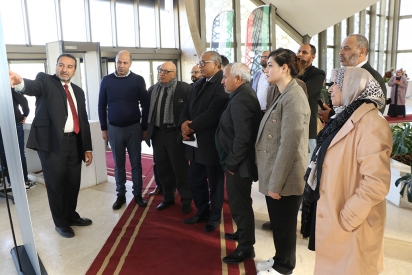Search
12/24: Insights from the IMAP workshop in Libya
SPA/RAC and the Libyan Ministry of Environment organized a workshop on the implementation in Libya of the Integrated Monitoring and Assessment Programme (IMAP) in Tripoli on 25 December 2023.
The event provided an opportunity to discuss the outcomes of the EU-funded projet EcAp MED III and to plan future steps for the effective execution of IMAP.
The workshop witnessed the active participation of the Libyan Minister of Environment, national stakeholders, and NGOs. National experts used a photo exhibition, posters, and oral presentations to foster discussions, which focused mainly on marine biodiversity monitoring.
The monitored sites are Farwa and Ain Al Ghazala, as Marine Protected Areas (MPAs), and Tripoli and Sirt as under-pressure sites.
Here are some highlights from the biodiversity monitoring:
- 116 kilometers of coastline were surveyed in 2022 to identify sea turtle nesting sites. An increase in the number of nests was observed compared to the 2019 data.
- The monitoring confirmed the Good Environmental Status in marine benthic habitats within the two MPAs, Farwa and Ain Al Ghazala.
- Invasive species such as the blue crab Portunus segnis and Siganus fishes were identified, with the first report of the the invasive sea urchin Diadema setosum in Al Gara Island.
- Cetacean monitoring around Ain Ghazela MPA covered over 361 km of transect. 11 dolphin observations were recorded.
- Farwa Island and Tripoli coast have a rich seabird diversity. A remarkable nesting of Lesser crested terns and shags was reported in Garra Island.
The workshop also shed light on the outcomes of the EU-funded project IMAP-MPA, particularly IMAP Common Indicators 19, 13 14 related to pollution cluster and CI22 related to Marine litter. Monitoring highlighted that oil spill indicators were more pronounced in Tripoli Bay compared to Farwa MPA. Additionally, macroplastics, notably single-use plastic bottles, constituted a significant portion of marine debris in all the monitored sites.
The historical data and the new data collected thanks to the support of the SPA/RAC projects were uploaded into the IMAP Info System for the purposes of the next Good Environmental Status (GES) assessment.
Participants in the workshop put forth several recommendations and proposals. The results of the monitoring underscored the pivotal role of Marine Protected Areas in achieving Good Environmental Status. Mitigation tools were proposed to protect and reduce pressures on the studied zones in Tripoli and Sirt. Furthermore, participants recommended enhancing monitoring and sustaining continuous efforts for long-term data series in Libya.
The comprehensive work undertaken in Libya yielded valuable lessons from field surveys, providing insights that will guide updates to the IMAP in the upcoming biennium (2024-2025) within the Ecosystem Approach roadmap. The workshop not only facilitated discussions but also paved the way for informed decisions aimed at conserving and preserving the marine environment in Libya.




Suivez nous sur ...